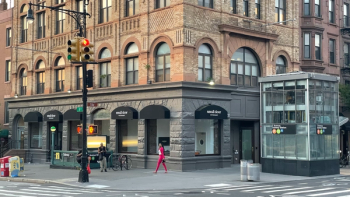
20 tips to survive a veterinary hospital construction project
Longtime veterinary architect Dan Chapel has tricks for keeping your sanity intact during this period of change.
Shutterstock.com
Building or renovating a veterinary hospital is a period of huge change for practice owners and team members alike. And 40-year-plus veteran veterinary architect Dan Chapel, AIA, NCARB, has 20 top tips to help you from being buried (figuratively) by your enormous project. Let's start with emotions …
Get a head start
1. Keep a positive attitude throughout the project. (It is your dream, after all.)
2. Before your project begins, plan a movie night for your staff (and maybe clients). Movies like The Money Pit with Tom Hanks or Mr. Blandings Builds His Dream House with Cary Grant are great choices. Later on, when you encounter problems with paint colors and contractors, you can laugh at how hysterical this was in the movies. Maybe you won't laugh, but it might help keep things in perspective.
3. Focus on what you can do as a practice owner, rather than what you can't.
4. Discuss and coordinate utility disruptions with your contractor well in advance so you're not surprised to find the water shut off on what should have been a busy morning.
5. Keep all contact information for all project team members at your fingertips.
6. If you have storage space, buy nonperishable items in bulk (and at a cheaper rate) before construction to reduce cost and deliveries during construction.
7. Know where your business stands financially and plan accordingly. Communicate as often as needed with your banker.
8. Before the project starts, chat with neighboring property and business owners and give them a heads-up.
Keep up with your clients
9. Show your clients appreciation as often as possible and make their experiences in your business unparalleled during this time of disruption.
10. If your parking lot is going to be disrupted or severely reduced, consider valet parking.
11. Hold employee appreciation events because they experience construction hardships during this process, too.
Watch yourself
12. Make sure safety precautions are taken. Are there signs posted that will help clients, their pets and your staff steer clear of possible hazards? Did the construction team shore up and barricade the area to keep people out and debris in?
13. Consider insurance coverage for surrounding properties. In cases of legal liabilities and legitimate claims, most contractors don't want to shoulder the full amount of whatever collateral damage the project causes. Most construction firms will have insurance policies for things like this.
14. Never leave decisions up to your contractor. Don't say, “Towel racks? I don't know, surprise me!” Men in tool belts will do anything to save a few bucks on a project, but that savings isn't necessarily passed on to you. Instead, be specific about every aspect of the project, no matter how trivial the matter.
15. Make sure your construction crew is licensed. This seems like a simple matter, but if unlicensed contractors take on projects that they can't handle, the practice owner will be the one to suffer. (Not to mention, in most places it's illegal for these guys to take on a project without a license.) If you're particularly cautious, you may want to run background checks on the manager and his employees.
16. Think about your bathroom situation. If the thought of sharing your restroom with a crew of 10 strange men disturbs you or your staff, rent a Porta Potty. Yes, it may be unsightly, but you won't have to spend the next three months armed with a can of Lysol every time you need to use the bathroom. (If you don't want to rent a Porta Potty, you'll probably need to clean the bathroom at the end of each workday.)
Stay the course
17. Remember that you're going to need patience. Yes, I know that the contractors said they'd be done before your busiest time of the year, but just because they promised doesn't mean there won't be delays.
18. Make the project an “event.” Let local news stations know what's happening at the start and completion of your project to drum up some publicity and potential new clients.
19. Use the project as an excuse to market to your clients. Hand out dry-cleaning coupons (with the hospital's logo and contact information) with an apology for soiled clothing. Give out play tools or hardhats (with the hospital's logo and contact information) to clients' kids. Offer car wash tickets (with the hospital's logo and contact information) while thanking the client for using your dirty parking lot.
20. Don't forget No. 1! Regardless of how large or small your construction project is, remember to be patient, hire someone with a license and, most importantly, keep a good sense of humor.
Dan Chapel is president of Chapel Associates in Little Rock, Arkansas, a nationally recognized firm specializing in animal facility design, and frequent speaker at the Veterinary Economics Hospital Design Conference. His firm has participated in the design of more than 750 veterinary hospitals, boarding kennels and animal shelters.
Newsletter
From exam room tips to practice management insights, get trusted veterinary news delivered straight to your inbox—subscribe to dvm360.






